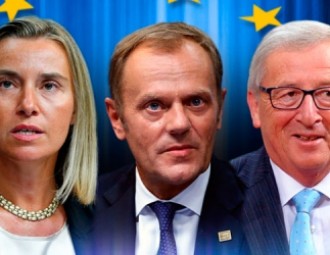Brussels still hopes for a dialogue with Belarus
 ucpb.org
ucpb.org
The leaders of the European Union have responded to the appeal of five Belarusian politicians about the prospects of development of Belarus-EU relations.
The open letter was signed by Mikalai Statkevich, Uladzimir Niakliaeu, Siarhei Kaliakin, Anatoly Liabedzka, and Pavel Sieviarynec. As Euroradio recalls, more than a month ago, the opposition proposed to implement a step-by-step road map for democratic change and the development of dialogue with the EU. Among other things, they raised the issue of setting up a negotiation process with the participation of representatives from the government and the opposition under the mediation of the OSCE, they also stressed the need for holding the 2016 parliamentary elections in accordance with democratic standards.
According to the press service of the United Civil Party, the answer to the letter of the Belarusian opposition politicians was written by the chairman of the European Council, Donald Tusk, Head of the European Commission, Jean-Claude Juncker, and EU High Representative for the Common Foreign and Security Policy Federica Mogherini. They thanked for the letter and said that "they took note of the analysis of the situation."
"The existence of a strong opposition is a vital necessity for the development of democratic and pluralistic societies. The electoral laws and procedures that meet international standards are certainly very important for the citizens to have a real choice," said the EU leaders in the letter. It notes that the EU will "urge" the Belarusian authorities to comply with the recommendations of the OSCE regarding the elections.
Tusk, Juncker and Mogherini stressed that "the EU has been engaged in a comprehensive process of improvement of the Euro-Belarusian relations." Brussels also hopes "for a more positive agenda with Belarus, increasing contacts and areas for cooperation."
"We are confident that the expansion of dialogue is the key to further progress in our relations. Human rights, democracy, rule of law and freedom of expression are all parts of the equation, the inner part of the EU engagement. Accession and active involvement of civil society in these processes will be crucial for development of such relations," said the letter, which was received from Brussels by the Belarusian opposition politicians.
-
03.01
-
07.10
-
22.09
-
17.08
-
12.08
-
30.09








































